This book is a real joy ... Michael has laid it out clearly, succinctly and approachably. Its a wonderful mix of clear, practical guidance and sound scientific evidence. Read this book, follow and practise the guidance, and enjoy the fruits!
Rebecca Crane , Director, Centre for Mindfulness Research and Practice, Bangor University
Before I met Michael I thought I knew all there was to know about my thoughts. I was wrong.
Eight weeks on I knew a feeling of space and calm. The internal chatter of my mind was there but not so demanding or noisy. Instead, I was just enjoying a new sense of seeing the world as it is rather than as the setting for my own thoughts.
David Sillito , Media and Arts Correspondent, BBC
This book provides a highly accessible way for people to learn mindfulness, experience its potential to relieve suffering, and cultivate joy, compassion and wisdom.
Willem Kuyken , Professor of Clinical Psychology, Exeter University
Mindfulness in Eight Weeks is a clear, practical and wise companion as you embark on the journey of transformation outlined in the books programme. With its balance of scientific knowledge, detailed meditation instructions and tips on how to bring mindfulness into daily life, it is indeed a trustworthy and accessible manual as, step by step, you change your mind and change your life.
Vidyamala Burch , Author and co-founder of Breathworks CIC
A great book for both novices and those familiar with mindfulness practice I highly recommend it.
Mark Williams Co-Author of the bestselling Mindfulness: A practical guide to peace in a frantic world
The ideas and practices discussed here truly change lives.
Dr. John Teasdale Co-Author: Mindfulness-Based Cognitive Therapy for Depression
As we campaign in Parliament and in government to raise awareness of the benefits of mindfulness training more generally, I hope this new book will open many more eyes to the great benefits that are so readily available with mindfulness practice
Chris Ruane MP
By now I hope you will have seen that there are a number of things you can actively do to keep yourself in better shape as you go through the day. Maybe youve already noticed how, by being a bit more mindful in each moment, you can come to make smarter decisions about what you really need in each moment, decisions that are informed by a clearer sense of your own thoughts, feelings, body sensations and impulses from moment to moment.
When you give mindful attention to your own changing experience, you are in a better position to regulate your own mode of mind and you can take better care of your body as well. For example, one of the simplest ways to take care of your physical and mental well-being is to take regular daily exercise: a regular brisk walk, for example, or swimming, jogging, going to the gym, yoga, Pilates, tai chi or mindful stretching.
Remember the exhaustion funnel we looked at in Week Four (see page 158)? We saw then how, when feeling really pressed at times of stress or other difficulty, were also likely to begin to give up on the things on the left-hand side of the funnel that actually make our lives sustainable. As these progressively fall away we can move closer and closer to burnout, to a stressed way of life that cant be sustained. Sometimes, maybe often, we just dont take good care of ourselves. Sometimes, maybe often, we can even be a bit unkind to ourselves.
But it doesnt have to be like that. By this stage of the course, I hope youll have begun to get a deeper sense of the non-judgemental aspect of mindfulness. Remember the connotations of the word judgemental that we looked at in the Introduction. When youre judgemental you can be critical, hypercritical, condemnatory, negative, disapproving, disparaging or pejorative. Often, the person were most judgemental about is ourselves.
Becoming more mindful doesnt only mean that you stop judging yourself so harshly and you leave it at that. When youre mindful, that judgementalism is replaced not by a cool, neutral state but actually by something warmer and kinder. As the mindfulness teacher Christina Feldman puts it:
The quality of mindfulness is not a neutral or blank presence. True mindfulness is imbued with warmth, compassion, and interest. In the light of this engaged attention we discover it is impossible to hate or fear anything that we truly understand. The nature of mindfulness is engagement; where there is interest, a natural, unforced attention follows.
As you become more mindful, you might begin to see that its possible to let your experience be as it is, without having to run a self-critical commentary around that. And more than that perhaps you can begin to allow some encouraging self-talk to enter the picture from time to time, replacing punishing self-criticism with helpful and kindly encouragement: Come on, you can do this, youve got it in you. Wont it be great to pull this one off?
Often, we make allowances for other peoples humanity but we expect some kind of superhuman capacity from ourselves. But really were all in this together were all frail human beings with our wants and our pains, our sadnesses and our joys. Were allowed to be human too.
Sometimes life is kind to us, at other times its tough. With mindfulness practice, you can learn to enjoy the good things and also to accept what is challenging, staying with it mindful and attentive letting what is here be what is here while also navigating mindfully, making more skilful choices and heading towards more desirable outcomes.
 Box 1: What if there is no Need to Change?
Box 1: What if there is no Need to Change?
What if there is no need to change?
No need to try to transform yourself
Into someone who is more compassionate, more present, more loving, more wise?
How would this affect all the places in your life where you are endlessly trying to be better?
What if the task is simply to unfold,
To become who you already are in your essential nature:
Gentle, compassionate, and capable of living fully and passionately present?
What if the question is not
Why am I so infrequently the person I really want to be?
But Why do I so infrequently want to be the person I really am?
How would this change what you think you have to learn?
What if becoming who and what we truly are happens not through striving and trying
But by recognising and receiving the people and places and practices
That are for us the warmth of encouragement we need to unfold?
How would this shape the choices you make about how to spend today?
What if you know that the impulse to move in a way that creates beauty in the world
Will arise from deep within
And guide you every time you simply pay attention
And wait?
How would this shape your stillness, your movement,
Your willingness to follow this impulse
To just let go
And dance?
Using the Breathing Space and Choosing an Action Step
One of the most important practices on this course is the three-step breathing space. When challenges arise, the breathing space can make a real difference. But sometimes it wont in itself be enough to help you deal with a challenging set of circumstances. Sometimes you need to do more. There will be times when, after doing the breathing space to help you deal with a challenge, it may feel appropriate to take some considered action to help you take better care of yourself in the situation.
At such times, after the breathing space you can stay paused before re-engaging with your usual tasks and ask yourself: What do I most need right now? How can I best take care of myself?
Here are some activities that may be particularly helpful at such times:
- Do something pleasurable.
Next page
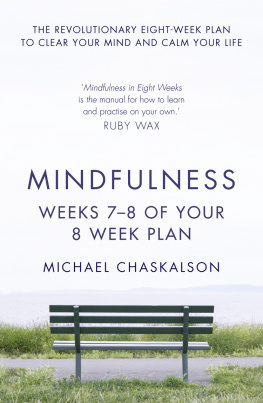
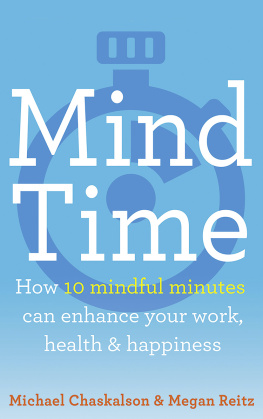
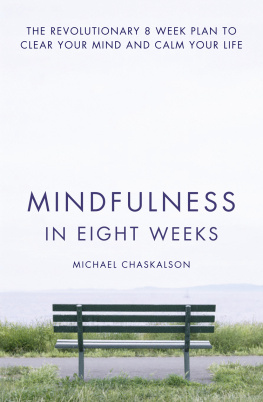
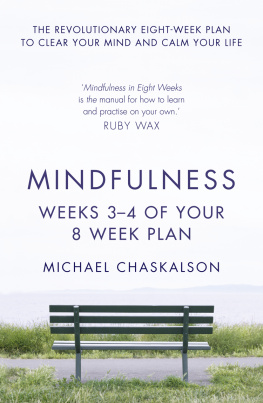
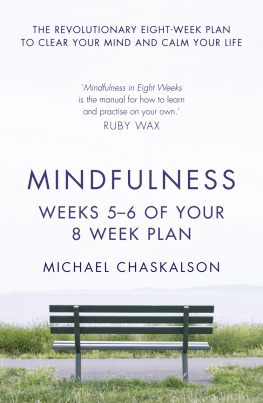

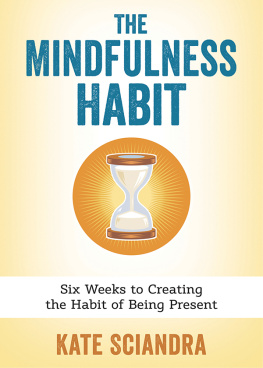
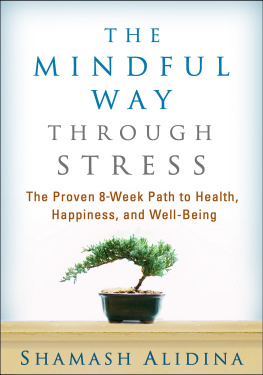
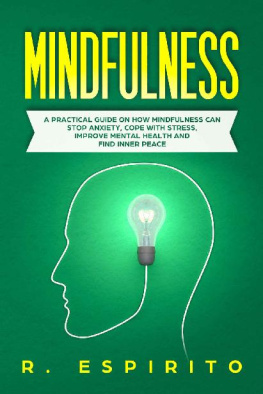
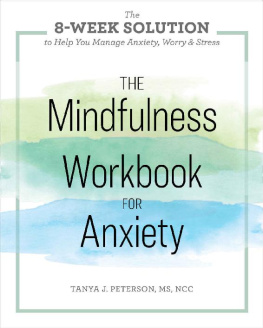
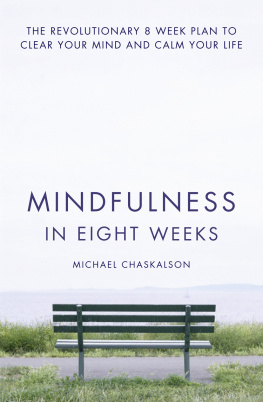
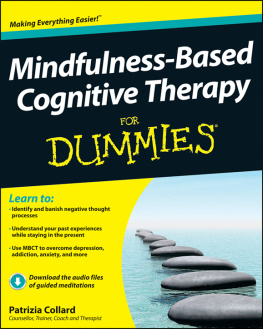
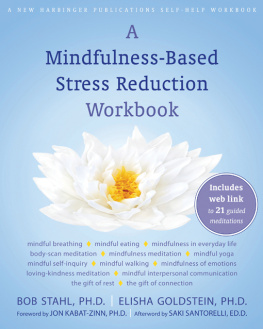
 Box 1: What if there is no Need to Change?
Box 1: What if there is no Need to Change?